
Another article from last week talked about how well Bayani Fernando is doing as chair of the Metro Manila Development Authority.
I think from an enforcement perspective, he has been very effective. Creatively effective, in fact, but the current controversy about the police and administrative power of the MMDA should grow beyond turf and jurisdiction wars to a serious discussion of the need for a regional/metropolitan planning authority.
In it's current form the MMDA (as created by the MMDA Law) is an administrative, enforcement agency that is tasked with solving metrowide implementation issues - traffic, waste management, flood control. It does not have a forward looking, urban planning perspective.
Although I fully subscribe to the LGU Code and it's intent of decentralizing power, the cities and towns of metro manila cannot afford to balkanize on planning. The Metro has to think as a region and plan its growth as a region.








